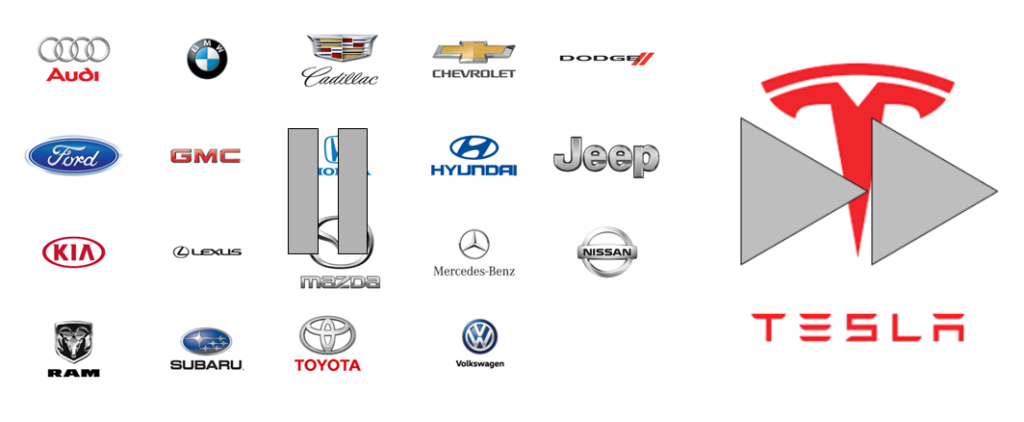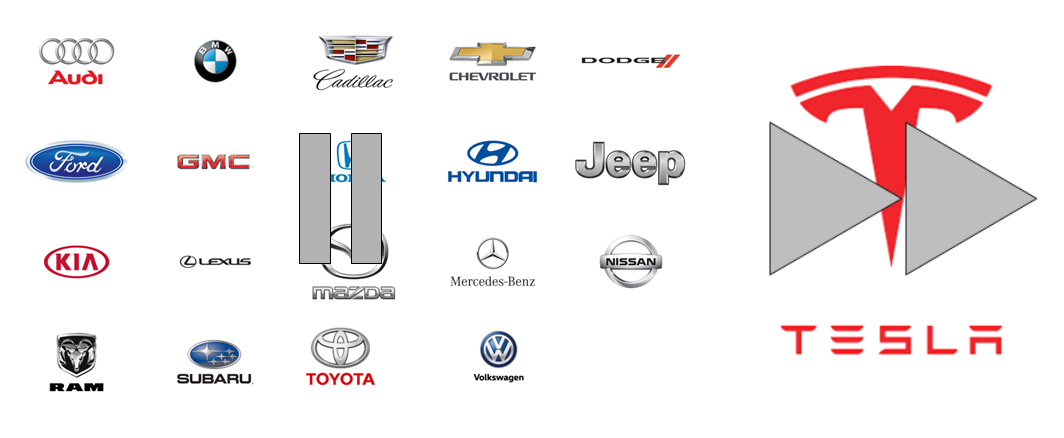
With Tesla Motors’ CEO Elon Musk spewing accusations of civil rights violations and fascism in the face of restrictions forcing him to keep his Fremont, California factory closed it is tempting to assume that Tesla is suffering through the shutdown with the rest of us. Don’t kid yourself. The COVID-19 pandemic is a crisis tailor-made for Tesla and one upon which Musk is even now capitalizing.
Musk’s Tesla is perfectly positioned for this pandemic. While parking lots are filling up with unsold cars and dealers are champing at the bit to be allowed to sell cars, Tesla Motors continues to deliver cars directly to consumers. Musk even went so far on the earnings call as to tout his progress toward a touchless vehicle purchasing proposition allowing a vehicle acquisition to occur within five minutes from a mobile phone app.
Tesla earnings recording: https://ir.tesla.com/events-and-presentations
Cars.com reports that dealers across the U.S. are struggling with 50 different state-level regulatory approaches to stay-at-home orders with some allowing vehicle repairs but no sales, others allowing only online sales, and many actually allowing vehicle sales from retail stores. There’s just one problem, consumer surveys show that potential buyers by-and-large don’t want to visit dealerships at this time.
Cars.com reporting: https://www.cars.com/articles/coronavirus-and-cars-can-i-buy-a-car-or-have-one-repaired-in-my-state-420549/
For their part, dealers have been scrambling to enable online sales – wrangling with local restrictions and restrictive franchise laws intended to protect traditional automobile retailing from online sales that have now become a barrier to that very thing.
While dealers and governors and regulators wrangle, Musk is laughing all the way to the bank. On last week’s earnings call he joked that buying a car these days is like a visit to the dentist – only worse.
SOURCE: Images of the jam-packed parking lots at the Port of Los Angeles on April 24th, with the Jupiter Spirit waiting with its cargo of cars in the harbor. Satellite images courtesy of MAXAR.
From one of his multiple homes in Los Angeles one can imagine Musk LOL-ing at the Jupiter Spirit, a container vessel loaded with 2,000 Nissans, idled in the harbor for weeks waiting to offload its cargo while personnel onshore scrambled to make room for the incoming vehicles. Needless to say, Tesla Motors doesn’t have those kinds of troubles. Those are the kinds of troubles reserved for the makers of gas-fueled automobiles sold by instantly irrelevant dealers.
Musk may put on a good show for the analysts and stockholders over California limiting his production plans, competitors may even cluck their schadenfreude-ish tongues his way, but it is clear that Tesla’s moment has arrived. An electric powertrain for a vehicle directly delivered to customers is a business model from the future with which today’s automobile industry is unable to compete.
Not content to humiliate competing car makers and disintermediate an entire distribution channel with millions of workers, Musk says he is adding operating-room-grade in-vehicle air filtration to his cars. (Ford Motor Company manufactured personal protective equipment and General Motors made ventilators to combat COVID-19. Tesla created its own ventilator from Model S and Model 3 parts – but never delivered.)
While the legacy auto industry spins its wheels and struggles to drop the clutch on massive structural impediments to its own progress, Tesla is waiting for the flag to drop on the final stage of its industry take over. Forecasters are talking about post-COVID-19 declines of 20%-25% in vehicle output globally, while Tesla is notching its growth rate expectations down to 40% from 50%.
Tesla can restart at the flip of a switch. The competition needs a week to ramp up supplier factories before revving production back up. But that revved up production will be shipping into a massive back-up of unsold vehicles – including cars returned from ailing rental car companies.
To make matters worse, Tesla will instantly begin shipping cars directly to consumers while dealers struggle to simultaneously reassure customers that it’s okay to visit newly opened showrooms while offering online sales, for many of them, for the first time.
Meanwhile, the pandemic impasse gives Musk yet another soapbox to proclaim his defense of the common man against the ravages of government regulators and the legacy auto industry (from this week’s earnings call):
“So, the extension of the shelter-in-place or, frankly, I would call it, forcibly imprisoning people in their homes against all their constitutional rights…Tesla will weather the storm (but) there are many small companies that will not. And … everything people have worked for their whole life is going to get — is being destroyed in real time. And we’re going to have many suppliers — or have many suppliers that are having super hard times.
“I think the people are going to be very angry about this … They should be allowed to stay in their house, and they should not be compelled to leave. But to say that they cannot leave their house, and they will be arrested if they do, this is fascist. This is not democratic. This is not freedom. Give people back their goddamn freedom.”
Needless to say, no competing auto maker CEO is capable of speaking this freely. It’s pretty potent yet apolitical stuff. Just raw meat for Tesla fans, Tesla owners, and those that want to own a Tesla. One can almost imagine the masses in driving gloves and bearing pitchforks and torches marching on the municipal offices in Fremont shouting: “Free Elon!”
It is high noon in the automotive industry. COVID-19 has brought the future to the industry’s doorstep. It’s now or never for every legacy auto maker and dealer to step up their game, step up their product, step up their incentives, step up their outreach, step up their service, and get in the game. Nothing will ever be the same. We are all now on COVID-19 time.








TSMC vs Intel Foundry vs Samsung Foundry 2026